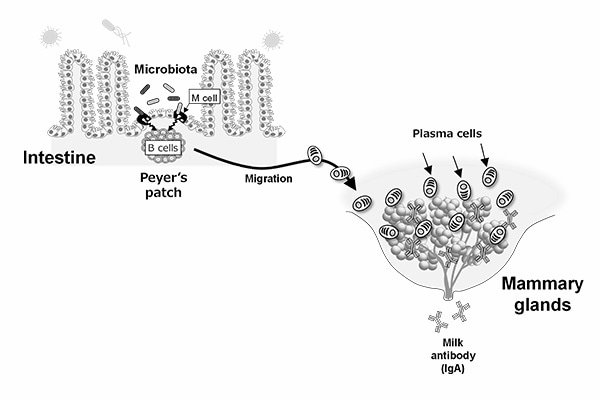Breastfeeding provides numerous benefits for both newborns and mothers. Maternal antibodies are transmitted through breastfeeding, safeguarding the gastrointestinal tracts of infants from numerous pathogen-caused infections.

A schematic that shows IgA's producing plasma cells migration from the intestine to the mammary gland. Image Credit: ©Nochi et al.
However, the molecular mechanism through which maternal antibodies, particularly immunoglobulin A (IgA), are produced in mothers at the time of lactation still amazes the researchers.
Recently, a group of scientists headed by Tomonori Nochi from Tohoku University’s Graduate School of Agricultural Science observed that an interorgan network between the mammary glands and the small intestine plays a vital role in maternal antibody transmission through breastfeeding.
The observations of the study were published on September 7th, 2021, in the Cell Reports journal.
Nochi says the study was linked to a demand to create an immune strategy that heightens the quantity and quality of maternal IgA in milk.
In the past, scientists have struggled to fully comprehend antibody production in lactating mothers. This has hindered the discovery of immunological and microbiological approaches to increasing breastfeeding quality.”
Tomonori Nochi, Graduate School of Agricultural Science, Tohoku University
The findings of the study indicated the major part Peyer’s patches (PP)—immune sensors present in the gastrointestinal tract—play in producing maternal IgA.
The researchers also pointed out two vital bacterium types—Bacteroides acidifaciens and Prevotella buccalis—which cohabitate the gastrointestinal tract of mothers, induce immune responses in PPs through antigen sampling M cells, resulting in IgA-producing plasma cells moving to the mammary glands.
Our results provide significant insights into the development of probiotics that facilitate the transfer of sufficient amounts of maternal antibodies from mother to the neonates via breastfeeding.”
Tomonori Nochi, Graduate School of Agricultural Science, Tohoku University
Source:
Journal reference:
Usami, K., et al. (2021) The gut microbiota induces Peyer’s-patch-dependent secretion of maternal IgA into milk. Cell Reports. doi.org/10.1016/j.celrep.2021.109655.